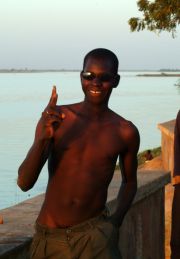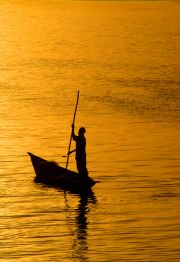When I arrived in Mali, I could not wait to get out of Bamako. Somehow I knew that I should start my holiday in Segou instead. And when I did, the lovely smiles of the locals bewitched me. I wanted to stay forever.
|
I went to Segou on my way to Timbuktu. I arrived in the afternoon and after the sunset, I took a stroll around the town. I saw many people from the riverboats peacefully sleeping with their luggage on the riverbank under the stars, and the full moon covered them with a thin transparent silver blanket. I had a few ideas why those people were sleeping there, but they all proven to be incorrect. I thought they were waiting for their river connection or for the boat to continue taking them to their destination since navigating might have not been allowed in the night. They were simply hoping to be the first on the market the next morning. And they were the sellers and not the buyers.
Monday was market day. It was a bit crazy and extremely overcrowded but colourful if a little odoriferous. The most popular item being sold on the market was fish, in all forms, shapes, freshness, flavours and scents. That was the main source of the smell cruelly molesting the deep interior of my nose and brutally scratching my throat. I have no idea how many people were trading there in Segou, along the Niger and in the nearby streets, but it was just too difficult to pas through. It was taking ten times longer to walk from the L’Esplanade to the Djoliba.
During the market day, I also noticed another aspect of life in Africa. It was the donkeys. I spotted the donkeys several years before, but what I realised in Segou was how the donkeys were really treated. Those poor, extremely hard working donkeys were mercilessly beaten by their owners. They were beaten so hard on the back that each hit made a loud, terrible, deep sound of suffering and helpless body. Many of the donkeys, which were working with the traders on the market had horrific, open wounds and were bleeding shockingly. I felt so sorry for them, because those poor creatures suffered terribly but were taking the abuse humbly, almost patiently, knowing that the beating will eventually stop at night.
|
|
| Favourite spots: |
The Niger River riverbank. The sunset came and it was seriously immaculate. I am not sure if I ever saw a prettier one. It was unbelievable. The sun did truly look real – a giant fireball in the distance. It was fantastically three dimensional – not a simple flat circle in the sky but really a sphere descending inevitably into the slowly moving waters of the river. It was a picture. I stood there on the riverbank completely hypnotised. I read about those fabulous sunsets on the Niger River, but having seen so many sunsets over water in my life, I was rather sceptical about the fabulousness of this one. I was wrong.
There was another element that kept magnetising tourists and me to the river. It was the people's silhouettes busy with their evening activities and long narrow fishing pirogues barely moving in the middle of this vast river. That was a dream come true scenery to any, even exceptionally demanding photographer. I almost fainted there!
|
|
| What's really great: |
|
The Old Segou (Segou-Koro) - 10km from the commercial centre. It’s actually more of a village rather than a town, but it’s very interesting and it’s packed with significant historical structures. There is a tomb of one of the very important kings King Biton Mamary Coulibaly, who ruled the Empire of Segou, following the fall of the Mali Empire. The tomb is rather small and a short mud wall, nowadays usually covered with drying clothes, surrounds it. This nicely indicates that although people do respect their ancestors but they are not necessarily paranoid about the holiness of their tombs. There are also two magnificent old mosques, one of which is located at the shore of the Niger making the spot one of the most picturesque in Segou. There is also a school for the Islamic marabouts, which can be visited when there are no classes. The chief of Segou-Koro charges CFA 2500 per visitor. The chief is tall, serious and rather non-talkative man, who yet happily shakes hands with visitors.
|
|
| Sights: |
The greener Segou, a district between the centre and Segou-Koro. It is the area of many grand, Neo Sahel style colonial buildings erected among evergreen trees, which make Segou a truly great and magnificent city, yet underappreciated. This part of the town is exceptionally elegant. The streets are clean and the buildings are kept in a good condition and look quite modern and comfortable. The area is calm and emanates something magical. The sun sneaks in though the upper twigs of the trees creating multiple shadows on the ground. I think this could actually be one of the best looking towns in West Africa that I’ve seen.
The majority of the buildings there housed state institutions, like the police, the governor, hospital, etc. Several families were very fortunate to occupy some of the buildings as well. Their children were playing football among young birch trees, creating a picture, as it was taken from an illustration of a great novel about travel, adventure and discovery.
|
|
| Accommodations: |
|
My original hotel choices, Hotel Djoliba and Hotel L’Auberge, did not have a room for me. I made an email booking at the Djoliba Hotel, but having not heard from them before I left home, I was not sure if they actually should have kept a room for me and whether I should argue or not. I was so lazy, that I did not even try to look in my guidebook if there was something else in the town that I could try. I was sensing that there should be but I was not sure how long it would take me to wander around and kept asking if there were vacancies. I knew there were several options out of town. The owner of L’Auberge scared me that the times were busy for hotels, and that I should rather start moving if I did not want to sleep in the street. But no-one is ever forced to sleep in the street due to an apparent lack of accommodation. One can sleep under the stars on the roof, for example or in a private home. I stayed at a dodgy Hotel L’Esplanade by the river (CFA 20,000 (£20)).
|
|
| Nightlife: |
|
Hotel L’Esplanade was running a bar at the river bank. It was a fine bar with an excellent location for river watching with all the action going on over there. It was also great for sunset, as there were benches outside. Unfortunately, they did not have large fridges and they were running out of cold drinks very quickly, often having no coke and no tonic.
|
|
| Hangouts: |
 |
 |
 |
 |
 |
 |
 |
 |
Segou boy at the promenade
 |
 |
The Niger riverfront was best for hanging out. It is a solid, concrete promenade and a dyke protecting the town from flooding and providing the people with comfortable sidewalk right on the riverbank. This promenade is so unusual for Sahel countries. It impressed me. When I compared it with the riverfront of Saint- Louis in Senegal, where the banks were also strengthened with concrete, the one of Segou won easily. It was a perfect place for chilling. Many people did. It was obvious they loved it. The promenade was the centre for contemplation and cleansing. Cleansing was for people who took bath in the river - in their birthday suits. Contemplation was for those, who could spend an hour without saying a word - watching a giant golden ball diving into the river, far at the horizon, as the day came to an end. This, was the place where I met most of the people, whom I met in Segou.
|
|
| Restaurants: |
 |
 |
 |
 |
 |
 |
 |
 |
Another sunset at the Niger
 |
 |
I loved one restaurant in particular. It was the Soleil de Minuit (Midnight Sun). It served delicious captain fish. I tried all of its versions served there, and could not get over how yummy the brochette was. It was also inexpensive (approx. CFA 1500) and frequented by locals, at least those, who could afford it. I went there several times. I have no idea what the English name for the fish was, but it was going down well with green peas or green beans. I made a routine of eating this combination that the locals started to call me - Mr Krys Haricot Vert. L'Auberge Hotel had a great restaurant, too and offered a long, comprehensive menu full of international dishes, which included pizza! I could not try pizza, since the chef that was on duty when I went, could not make one.
|
|
| Other recommendations: |
|
A local guide convinced me to take a trip on the Niger River to the other side to see the villages. The trip, however, was a mistake. It is a very boring ride across a very wide river. Although I chose a late evening hour for the ride hoping I could combine the trip with watching the sunset, the Harmattan wind had brought so much dust from the Sahara that there was hardly a sunset at all. I am sure that had there been no dust the trip would have been much more pleasant. However, I ended up sitting in a narrow boat unimpressed with its speed. The village on the other side was nothing different than any other village in the area. It was actually called a shopping village, which naturally meant that it was not for me to visit. I did not go to Mali to do shopping, although there was actually nothing there I, or any other tourist, would be interested to buy. The village was packed with shops selling firewood, fish, and freshly cooked meals.
|
|
Published on Monday February 11th, 2008
|
|
 Publish on Facebook
Publish on Facebook
|
Fri, Mar 14 2008 - 01:48 PM
 by alfonsovasco
| a report written by a maestro in literature |
Sat, Mar 08 2008 - 05:29 AM
 by magsalex by magsalex
| Your pictures are outstanding and reports a joy to read. |
Wed, Feb 13 2008 - 06:03 AM
 by rangutan by rangutan
| Superb pictures and great style of writing. |
Tue, Feb 12 2008 - 01:29 PM
 by davidx by davidx
| I agree with Jorge - this is a gem indeed. I never dreamed that this area could be made so interesting. |
Mon, Feb 11 2008 - 08:06 PM
 by jorgesanchez by jorgesanchez
| This is the eighth gem report that you have written, so far. Eight times thank you! |
| Information: |
| Login if you are a member, or sign up for a free membership to rate this report and to earn globo points! |
|
| Democratic Republic of the Congo |
|
|
 |
| Denmark |
|
|
 |
| Djibouti |
|
|
 |
| Dominica |
|
|
 |
| Egypt |
|
|
 |
| El Salvador |
|
|
 |
| Eritrea |
|
|
 |
| Estonia |
|
|
 |
| Ethiopia |
|
|
|
|
|
|
 |
| Fiji |
|
|
 |
| Finland |
|
|
 |
| France |
|
|
|
|
|

|
